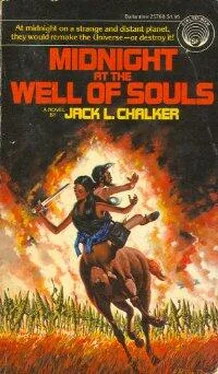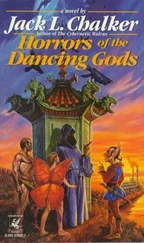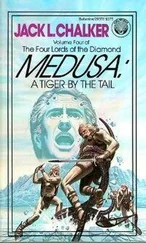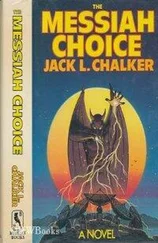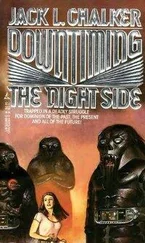“But once the Markovians discovered the mathematical constructs governing stability, why didn’t they change them?” Skander asked. “Why keep the rules?”
“They didn’t dare try to tackle the master equations, those governing physical properties and natural laws,” Brazil replied. “They could alter things a little, but common sense should tell you that in order to change the master equation you first have to eliminate the old one. If you do that, what happens to you and the rest of the universe? They didn’t dare—so they imposed new, smaller equations on localized areas of the preexisting universe.”
“Not gods, then,” Vardia said quietly. “Demigods.”
“People,” Brazil responded. “Not gods at all. People. Oh, I know that this form I’ve got is quite different than you’d think, but it’s no more monstrous or unusual than some of the creatures of this world, and less than some. The many billions of beings who wore bodies like this were a proud race of ordinary people with one finger on the controls. They argued, they debated, strove, built, discovered—just like all of us. Were their physical forms closer to the ones we’re familiar with, you would possibly even like them. Remember, they achieved godhood not by natural processes, but by technological advancement. It was as if one of our races, in present form, suddenly discovered the key to wish fulfillment. Would we be ready for it? I wonder.”
“Why did they die, Brazil?” Skander asked. “Why did they commit suicide?”
“Because they were not ready,” Brazil replied sadly. “They had conquered all material want, all disease, even death itself. But they had not conquered their selves. They reveled in hedonism, each an island unto itself. Anything they wanted, they just had to wish for.
“And they found that wasn’t enough. Something was missing. Utopia wasn’t fulfillment, it was stagnation. And that was the curse— knowing that the ultimate was attainable, but not knowing what it was or how to attain it. They studied the problem and came up with no solutions. Finally, the best amplified Markovian minds concluded that, somewhere in their development, they’d lost something—the true fulfillment of the dream. The social equation did not balance, because it lacked some basic component. One plus two plus three equals six, but if you don’t have the plus two in there, it can’t possibly reach more than four.
“Finally, they came to the conclusion that they were at a dead end, and would stagnate in an eternal orgy of hedonism unless something was done. The solution seemed simple: start over, try to regain the missing factor, or rediscover it, by starting from the beginning again. They used a variety of races and conditions to restart, none Markovian, on the idea that any repetition of the Markovian cycle would only end up the same.”
“And so they built this world,” Varnett put in.
“Yes, they built this world. A giant Markovian brain, placed around a young but planetless sun. The brain is the planet, of course, everything but the crust. Gravity was no problem, nor was atmosphere. They created an outer shell, about a hundred kilometers above the surface. The hexagons are all compartments, their elements held in all directions by fields of force.”
“So it was built to convert the Markovians to new forms?” Skander asked.
“Double duty, really,” Brazil told them. “The finest artisans of the Markovian race were called in. They made proposals for biospheres, trying to outdo one another in creativity. The ones that looked workable were built, and volunteers went through the Zone Gate and became the newly designed creatures in the newly designed environments. Several generations were needed for even a moderate test—the Markovians didn’t mind. A thousand years was nothing to them. You see, they could build, pioneer-style, but they were still Markovians. A lot of generations born in the biome and of the new race were needed to establish a culture and show how things would go. Their numbers were kept relatively stable, and the fields of force were much more rigid then than now. They had to live in their hex, without any real contact with other hexes. They had to build their own worlds.”
They were riding down now, at a deceptively steep angle. Down into the bowels of the planet itself.
“But why didn’t the first generation establish a high civilization?” Varnett asked. “After all, they were just like us, changed outside only.”
“You overestimate people from a highly technological culture. We take things for granted. We know how to turn on a light, but not why the light comes on. None of us could build most of our artifacts, and most civilized races become dependent on them. Suddenly dumped in a virgin wilderness, as they all were, they had no stores, no factories, no access to anything they didn’t make themselves out of what was available. A great many died from hardship alone. The tough ones, the survivors, they built their own societies, and their children’s societies. They worked with purpose—if the test failed, then they died out. If they succeeded—well, there was the promise that the successful ones would someday go to the Well of Souls at midnight, and there be taken to a new world, to found a new civilization, to grow, develop, perhaps become the progenitors of a future race of gods who would be fulfilled. Each hoped to be the ones whose descendants would make it.”
“And you were here when that happened,” Wuju said nervously.
“I was,” he acknowledged. “I assisted the creator of Hex Forty-one—One Eighty-seven, the hundred and eighty-seventh and last race developed in that hex. I didn’t create it, simply monitored and helped out. We stole ideas from each other all the time, of course. Dominant species in one hex might be a modified pattern of animals in another. Our own race was a direct steal from some large apes in another hex. The designer liked them so much that not only did the dominant race turn out to be apes, but they were almost endlessly varied as animals.”
“Hold on, Brazil,” Skander said. “These others might not know much about things, but I’m an archaeologist. Old Earth developed over a few billion years, slowly evolving.”
“Not exactly,” Brazil replied. “First of all, time was altered in each case. The time frame for the development of our sector was speeded up. The original design produced the life we expected, but it developed differently—as giant reptiles, eventually. When it was clear that it wouldn’t do to have our people coexist with them, a slight change in the axial tilt caused the dinosaurs to die out, but it placed different stresses on other organisms. Minor mammals developed, and to these, over a period of time, we added ours to replace the ones logically developing in the evolutionary scale. When conditions seemed suitable for us, when apelike creatures survived, we began the exodus. Soon the temperate zones had their first intelligent life. Again, with all the resources but nothing else. They did well, astonishingly so, but the long-term effects of the axial tilt produced diastrophism and a great ice age within a few centuries. Our present, slow climb has been the product of the extremely primitive survivors of those disasters. So, in fact, has it been with all your home worlds.”
“Is there a world, then, or a network of worlds of the Akkafians?” Hain asked.
“There was,” Brazil replied. “Perhaps there is. Perhaps it’s larger and greater and more advanced than ours. The same with the Umiau, the Czill, the Slelcronians, the Dillians, and others. When we get to the Well itself, I’ll be able to tell you at least which ones are still functioning, although not how, or if they’ve changed, or what. I would think that some of the older ones would be well advanced by now. My memory says there were probably close to a million races created and scattered about; I’ll be curious to see how many are still around.”
Читать дальше
